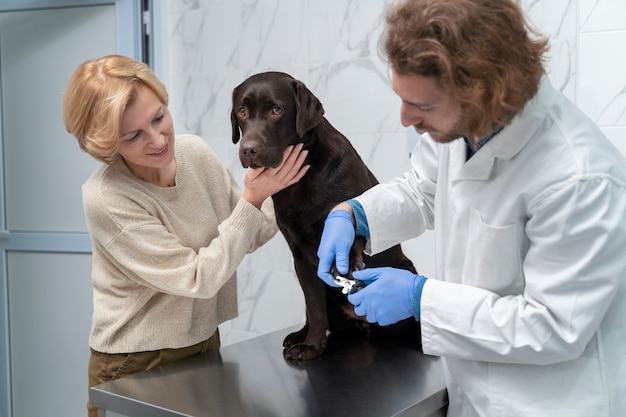Unexplained Weight Loss in Pets: Cancer Warning Signs


Unexplained Weight Loss in Pets: Cancer Warning Signs
When your beloved dog or cat starts losing weight for no clear reason, it can be alarming and leave you searching for answers. Unexplained weight loss in pets is not just a cosmetic issue; it can be one of the most significant cancer symptoms in dogs and cats. At Veterinary Cancer Health, located at 4101 Turtle Creek Drive, Coral Springs, FL, our oncology team understands the anxieties that come with such changes and is committed to providing advanced cancer diagnostics and compassionate care for pets in Coral Springs and surrounding communities.
In this blog, we will explore why weight loss in pets can signal underlying cancer, what signs to watch for, when to seek the expertise of an oncology vet near me, and how specialized services like cancer diagnosis and staging in Coral Springs can guide your next steps. Whether you are concerned about your pet’s sudden drop in weight or looking for specialized cancer care, we aim to answer your questions and help you feel supported every step of the way.
Recognizing Weight Loss and Other Cancer Symptoms in Dogs and Cats
When to Worry About Weight Loss
Pet owners often notice subtle changes in their dog or cat’s body condition before more obvious symptoms appear. While it is common for pets to fluctuate slightly in weight due to diet or activity changes, persistent or rapidly progressing weight loss is cause for concern. Warning signs to watch for are a visible decrease in muscle mass, more prominent ribs or spine, loose-fitting collars, or a general sense that your pet feels “lighter” when you pick them up.
Additional cancer symptoms in dogs and cats frequently appear alongside weight loss. These include a decrease in appetite, vomiting or diarrhea, increased thirst or urination, lethargy, and unexplained lumps or swellings. Sometimes, the only change you may observe is gradual weight loss with no obvious signs of illness. This is especially true for cats, who can mask discomfort and disease until conditions become advanced.
If your pet is losing weight for reasons you cannot explain, particularly if they are also showing other symptoms like fatigue or gastrointestinal upset, it is important to seek veterinary diagnostics in Coral Springs or consult with an oncology specialist vet near me.
Why Does Unexplained Weight Loss Occur in Pets?
The Connection Between Cancer and Weight Loss
Unexplained weight loss in pets can stem from a variety of causes, ranging from chronic diseases to metabolic disorders. However, cancer is one of the most concerning reasons, particularly when weight loss is sudden or severe. Cancer disrupts normal body processes, often demanding more energy than your pet can consume and leading to what veterinary professionals call “cancer cachexia”—a syndrome involving muscle and fat loss even if your pet seems to be eating normally.
Other causes of weight loss include gastrointestinal disease, dental problems, kidney or liver disease, and infections. What sets cancer-related weight loss apart is the tendency for it to occur even in the face of unchanged or only slightly decreased appetite. In some cases, tumors may interfere with the absorption of nutrients, trigger chronic inflammation, or release substances that alter metabolism. This is why advanced cancer diagnostics in Coral Springs are so critical for accurate diagnosis and effective treatment planning.
The Role of Location-Specific Veterinary Diagnostics
Local climate and lifestyle factors in Coral Springs can also play a role in your pet’s health. High temperatures, stress, or changes in daily routine can mask underlying illness, making it even more important to closely monitor your pet’s weight and behavior. For pet owners searching for veterinary diagnostics near me, finding an experienced oncology veterinarian near me is key to identifying the root cause of weight loss and related cancer symptoms in dogs and cats.
How Veterinary Oncologists Diagnose and Treat Weight Loss in Cancer Patients
What to Expect From Cancer Diagnosis and Staging
If your pet is experiencing unexplained weight loss and you suspect cancer may be involved, your general veterinarian may refer you to an oncology vet near me for a comprehensive evaluation. At Veterinary Cancer Health, our approach to cancer diagnosis and staging in Coral Springs involves a detailed medical history, thorough physical examination, and a suite of advanced diagnostic tools.
Diagnostic steps include bloodwork, urinalysis, and advanced imaging such as digital radiographs (X-rays), ultrasound, or CT scans to visualize internal organs and search for masses. A biopsy or cytology, where a small sample of tissue or cells is collected and analyzed, is often necessary to confirm a cancer diagnosis. For especially complex cases, our veterinary team may recommend DNA sequencing and molecular analysis to identify tumor types and guide personalized treatment options.
Treatment Plans Tailored to Your Pet’s Needs
Once a diagnosis is confirmed, treatment options are customized based on your pet’s condition, type of cancer, and overall health. At our veterinary oncology clinic, cancer treatment in Coral Springs may involve chemotherapy, targeted therapy, immunotherapy, or electrochemotherapy. Each of these modalities works in different ways to slow or stop cancer growth, improve quality of life, and help maintain a healthy weight for as long as possible.
Ongoing monitoring is vital to assess how your pet is responding to treatment and to make timely adjustments. Our ongoing cancer care and monitoring services ensure that any changes in weight, appetite, or behavior are quickly addressed by our veterinary professionals. In some cases, supportive care such as nutritional counseling, pain management, or palliative support becomes an essential part of maintaining your pet’s comfort and dignity.
Supporting Your Pet at Home: What Pet Owners Can Do
Practical Steps to Manage Weight Loss
While only a veterinary oncology specialist can definitively diagnose and treat cancer, pet owners play a crucial role in supporting their pet’s health at home. Steps you can take include closely monitoring your pet’s weight using a scale or by feeling for changes in body condition, offering high-quality, palatable foods that are appropriate for your pet’s medical needs, and keeping a daily log of appetite, energy levels, and other symptoms. Additionally, ensuring your pet stays hydrated and is encouraged to eat small, frequent meals can help manage mild weight loss while you seek veterinary diagnostics near me.
If your pet is already undergoing cancer treatment, follow all recommendations from your veterinary team regarding medication, dietary changes, and follow-up appointments. Communication with your oncology vet near me is essential for quickly addressing any changes in weight or overall health.
Emotional Support and End-of-Life Care
Unexplained weight loss in pets can be emotionally draining for pet owners. Remember that you are not alone—our veterinary oncology team is here to provide compassionate guidance, whether you are investigating new symptoms or navigating the challenges of advanced cancer. For pets with life-limiting illness, palliative and end-of-life care can help ease discomfort while allowing you to focus on quality time together.
When to Seek Advanced Veterinary Oncology Care
Recognizing When It’s Time for a Specialist
Knowing when to seek a specialist vet near me can make a profound difference in your pet’s journey. If your pet is experiencing persistent weight loss, lack of appetite, unexplained lumps, vomiting, or changes in behavior, and your primary care veterinarian suspects cancer, timely referral to an oncology vet near me is crucial. Early intervention and advanced diagnostics in Coral Springs give your pet the best chance at an accurate diagnosis and effective treatment.
Situations that require immediate attention include rapid weight loss over a period of days or weeks, refusal to eat, difficulty breathing, sudden collapse, or evidence of pain. In these cases, contact your primary veterinarian or an emergency clinic right away for stabilization; you can then pursue oncology referral as soon as possible.
For pet owners in Coral Springs and surrounding communities searching for advanced cancer care, our veterinary professionals at Veterinary Cancer Health are ready to support you with customized diagnostics, treatment options, and ongoing monitoring.
Take the Next Step: Contact an Oncology Vet Near Me in Coral Springs
Unexplained weight loss in pets can be a warning sign of cancer or other serious illness. Recognizing the early signs and seeking advanced veterinary diagnostics in Coral Springs can help you act quickly and give your pet the best chance for a positive outcome. Our team of oncology specialists at Veterinary Cancer Health is dedicated to providing expert care, emotional support, and clear guidance for every family we serve.
If you are concerned about weight loss or other cancer symptoms in dogs and cats, reach out to our veterinary oncology professionals today. We welcome referrals from primary veterinarians and are always here to answer your questions with compassion and expertise. For more information about our comprehensive cancer diagnosis and staging or to discuss ongoing cancer care and monitoring for your pet, call (195) 459-28504 or visit us at 4101 Turtle Creek Drive, Coral Springs, FL.
If you have been searching for an oncology vet near me or advanced cancer diagnostics in Coral Springs, let our veterinary team partner with you to pursue the answers your pet deserves. Your pet’s health and comfort are our highest priorities, and we are honored to be part of your care journey.
Medical Disclaimer: This blog is for informational purposes only and does not replace professional veterinary care. If your pet is experiencing unexplained weight loss or other concerning symptoms, please consult your veterinarian or a veterinary oncology specialist promptly.
For further reading on cancer symptoms in pets, consider reliable resources such as the American College of Veterinary Internal Medicine (ACVIM) or Veterinary Cancer Society.

.png)















